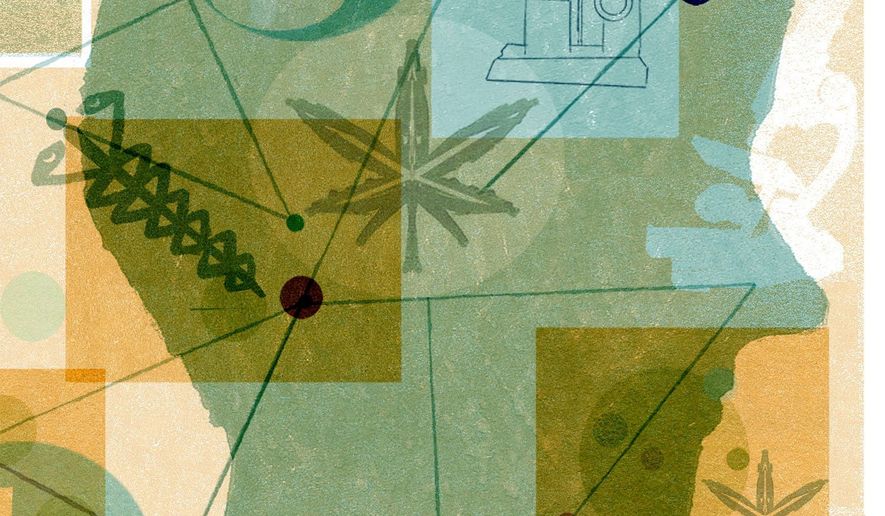OPINION:
Imagine the following scenario: You have a son or daughter who suffers from epilepsy. Seizures wrack your child’s body every day. Some days, he or she endures a dozen or more seizures. The condition prevents your child from going to school, from eating normally, from having friends. It also exacts a toll on you and your family. You cannot leave your child alone for any extended period of time, and certain activities, such as sports games, road trips or visits to the movie theater, are off limits.
You’ve tried dozens of treatments for your child’s condition, but none has shown any promise. You’ve spent thousands of dollars on doctors and experts, trying to find some way to reduce the seizures, but to no avail. Each new medication brings with it a host of side effects, and with each additional drug you try, the odds of your child responding positively decrease.
Then, one day, you hear about a new therapy that has shown remarkable success in treating children just like yours — children with intractable epilepsy. But there’s a problem: The therapy is made from a strain of the cannabis plant. The therapy doesn’t produce any sort of “high.” In fact, it’s made from a strain of cannabis that’s so low in THC — the active ingredient in marijuana — that it has no psychotropic effect even when ingested in large quantities.
But because the therapy comes from the cannabis plant, it’s classified as marijuana under federal law and is therefore illegal.
As a devoted, loving parent, you’re faced with an impossible dilemma. Do you break the law to obtain a therapy that could cure or at the very least substantially reduce your child’s devastating seizures? Or do you allow your child to continue to suffer? Remember, the therapy produces no high, and it carries none of the dangerous side effects of traditional marijuana. It simply comes from the same source.
This hypothetical scenario is a reality for tens of thousands of parents.
The therapy is called cannabidiol oil, or CBD for short. It’s administered by placing a small amount under the tongue, and has been shown to reduce seizures by more than 90 percent in children with intractable epilepsy. It is not addictive.
But because it’s made from the cannabis plant, CBD is illegal under federal law. To solve this problem, I’ve recently sponsored bipartisan legislation with Sens. Cory Gardner, Colorado Republican, Ron Wyden, Oregon Democrat, and others to exempt CBD from the definition of “marijuana” under federal law.
Our bill, S. 1333, will allow parents to obtain a life-changing therapy for their children without threat of federal prosecution. It’s colloquially known as the Charlotte’s Web Act, after Charlotte Figi, an eight-year-old girl who has seen extraordinary improvements from taking CBD. Prior to beginning treatment with CBD, Charlotte suffered as many as 300 grand mal seizures per week — seizures so violent that her parents put a do not resuscitate order in her medical records. After Charlotte started taking CBD, however, her seizures dropped dramatically. She now suffers, on average, less than three seizures per month and is able to engage in normal childhood activities. “Dateline NBC” and National Geographic recently highlighted the medical benefits of CBD for children with severe epilepsy.
CBD is not medical marijuana. It cannot be used to get high. Its only use is for epilepsy and other medical conditions.
Nor is it a camel’s nose in the tent for advocates of full marijuana legalization. Fifteen states have now legalized CBD. These include some of the most rock-ribbed conservative states in the country, such as Alabama, South Carolina and Texas. In fact, my home state of Utah — certainly no redoubt of hippie liberalism — was the very first state to legalize CBD.
Throughout my entire Senate career, I’ve taken a strong stand against illegal drugs. The proliferation of cocaine, meth and other addictive, mind-altering substances has had a devastating effect on homes and communities.
CBD is not like any of those substances. It is not addictive. To the contrary, it has shown promise in treating addiction. Rather than harming families, it can help make their lives better.
I continue to oppose marijuana and efforts to legalize its use. I remain unconvinced by claims that it is safe and that the side effects it causes are no big deal. Stories of children being rushed to the hospital for accidentally consuming marijuana edibles belie the notion that marijuana is a safe drug. In fact, I am currently working on legislation to help protect children from the dangers of edible marijuana products.
But I also believe that when a drug is safe and can improve people’s lives, Congress should not stand in the way. That CBD is derived from the cannabis plant does not mean we should be scared to have anything to do with it. Legalizing CBD is a compassionate, common-sense move that will bring relief to thousands of suffering children. I am glad to stand with my colleagues in supporting the Charlotte’s Web Act and look forward to helping it move through Congress and to the president’s desk.
• Orrin G. Hatch is a U.S. senator representing Utah.




Please read our comment policy before commenting.